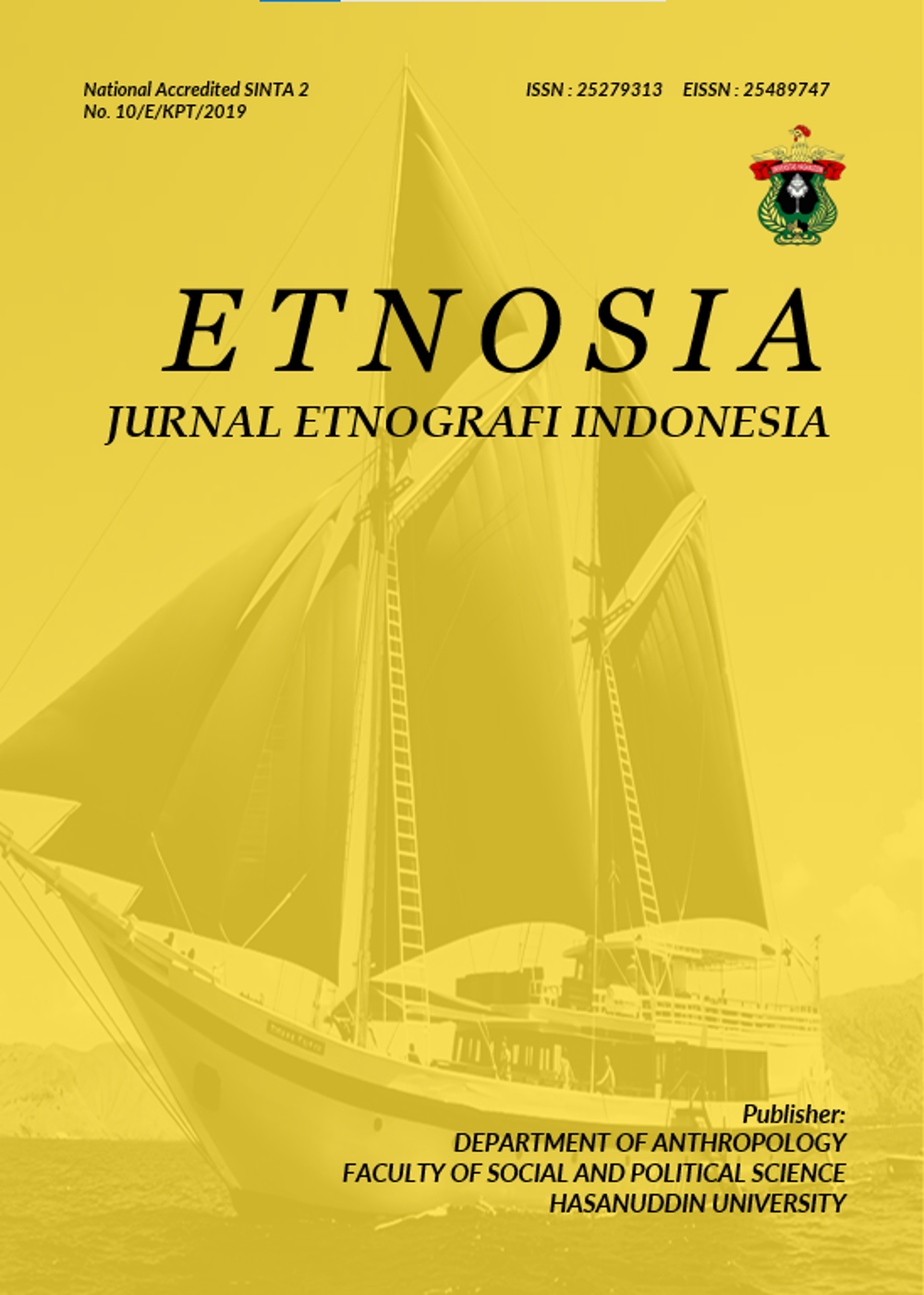Abstract
Local institutions that encourage self-organization to achieve shared-goals is a characteristic of social capital. In Bugis society, there is a social capital in farming communities called tudang sipulung, meaning “sitting together for deciding various matters related to farming”. However, tudang sipulung has been transformed. This study aims to determine causes, processes, and consequences of social change in tudang sipulung tradition. The data from this case study were collected by using in-depth interviews, observations, and document review. The results show that the cause of change was an abandonment of traditional rituals in farming because farmers consider that such rituals delay activities and require more cost, so to reduce the effectiveness and efficiency. In addition, there is also a shift in the position of actors, where the schedule of the planting which was previously determined by indigenous knowledge possessed by traditional leaders, changed to the role of climatologists and officers from the government. The process of social change takes long and slow along with the social dynamics of the rice farming community which makes tudang sipulung tradition as a place to work together to achieve shared-goal for farmers. Nevertheless, the process of social change has consequences for the elimination of kindness to each other and lack of trust among farmers.
References
Anggita, T. (2013). Dukungan Modal Sosial Dalam Konektivitas Usaha Tani Untuk Mendukung Kinerja Produksi Pertanian Studi Kasus: Kabupaten Karawang dan Subang, Jurnal Perencanaan Wilayah dan Kota, Vol. 24 No. 3: 203–226.
Buraerah. (2013). Analisis Deskriptif Data Riset Kesehatan. Makassar: Masagena Press.
Bourdieu, P., & Richardson, J. G. (1986). Handbook of Theory and Research for the Sociology of Education. The forms of capital, 241-258.
Cahyono, B., & Adhiatma, A. (2012). Peran modal sosial dalam peningkatan kesejahteraan masyarakat petani tembakau di Kabupaten Wonosobo. In Conference In Business, Accounting, And Management (CBAM) (Vol. 1, No. 1, pp. 131-144).
Cox E (2002) Australia: Making the Lucky Country. In: Putnam RD (ed) Democracies in Flux: The Evolution of Social Capital in Contemporary Society. Oxford: Oxford University Press, Inc.:395-412.
Edillon, R. G. (2012). Social capital and the decision to adopt new technology among rice farmers in the Philippines. Philippine Journal of Development, 37(1): 1-13.
Fahmid, I. M. (2011). Pembentukan Elite Politik di dalam Etnis Bugis dan Makassar Menuju Hibriditas Budaya Politik. Unpublished doctoral dissertation, Institut Pertanian Bogor, Bogor.
Fahmid, I. M. (2012). Tidal Polarization in Elite Ethnic and Makassar Bugis. Sodality: Jurnal Sosiologi Pedesaan, 6(2).
Fahmid, I. M. (2013). Typology of rural agrarian conflicts. Journal of Economic and Sustainable Development, 4(3), 171-178.
Hermawan, H., & Andrianyta, H. (2013). Peran tambahan modal terhadap pendapatan usahatani padi di Kabupaten Blitar dan Ngawi, Jawa Timur. Jurnal Pengkajian dan Pengembangan Teknologi Pertanian, 16(2), 132-139.
Isyanto, A. Y. (2012). Faktor-faktor yang Mempengaruhi Inefisiensi Teknik pada Usahatani Padi di Kabupaten Ciamis. Cakrawala Galuh, 1(5), 31-40.
La Nalefo, M.K. Yusoff, M.S.S. Ali, D. Salman, E.B. Demmallino, Meisanti, Muhidin, I.Y. Ismail, M.Kamaluddin, Nurwati, (2013). Towards and Institutional Sustainable Agriculture in Parabela. World Applied Sciences Journal. Vol.26.
Moenta, A, P. (1988). Sejarah Lahirnya Kabupaten Pinrang, Original Research & Symposium 28-30 Maret 1988, Dinas Pendidikan dan Kebudayaan Kabupaten Pinrang.
Pranadji, T. (2000). Kumpulan Naskah-Naskah Sejarah Sawitto, Raja-Raja Sawitto, Seksi Kebudayaan, Dinas Pendidikan Nasional Kabupaten Pinrang.
Saheb, S., Slamet, Y., & Zuber, A. (2013). Peranan Modal Sosial Bagi Petani Miskin Untuk Mempertahankan Kelangsungan Hidup Rumah Tangga Di Pedesaan Ngawi (Studi Kasus Di Desa Randusongo Kecamatan Gerih Kabupaten Ngawi Provinsi Jawa Timur). Jurnal Analisa Sosiologi, 2(1).
Soetomo. (2013), Strategi-Strategi Pembangunan Masyarakat, Pustaka Pelajar. Yogyakarta.
Susanto, D. (2010). Strategi peningkatan kapasitas modal sosial dan kualitas sumberdaya manusia pendamping pengembangan masyarakat. Jurnal Komunikasi Pembangunan, 8(1).
Syofian, S., Sujianto, S., & Handoko, T. (2020). Modal Sosial Kelembagaan Petani Karet di Kabupaten Kuantan Singingi. Gulawentah: Jurnal Studi Sosial, 5(1), 52-59.
Sztompka, Piotr. (2011). Sosisologi Perubahan Sosial. Fajar Interpratama. Jakarta.
van Rijn F, Bulte E, & Adekunle A (2012) Social capital and agricultural innovation in Sub-Saharan Africa. Journal of Agricultural Systems, 108:112-122.
Wahyuni, S. (2003). Kinerja Kelompok Tani Dalam Sistem Usaha Tani Padi Dan Metode Pemberdayaannya. Pusat Penelitian dan Pengembangan Sosial Ekonomi Pertanian, Bogor, Jawa Barat.
Widodo, S. (2012). Penguatan Modal Sosial Untuk Pengembangan Nafkah Berkelanjutan Dan Berkeadilan, Program Studi Agribisnis Fakultas Pertanian Universitas Trunojoyo Madura, Jawa Timur.
Yunus, A., Salman, D., Demmallino, E. B., & Viantika, N. M. (2016). Sociotechnical change and institutional adjustment in paddy rice farming during post green revolution in Indonesia. International Journal of Agriculture System, 4(2), 218-227.

This work is licensed under a Creative Commons Attribution-NonCommercial 4.0 International License.
Copyright (c) 2021 ETNOSIA : Jurnal Etnografi Indonesia





